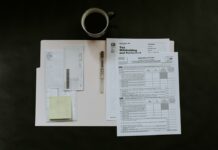How far have computers come since the first desktops took up a large portion of a room? Where digital solitaire was exciting and innovative, and the Word paper clip was an annoyance everyone became fond of, the world of computers is more advanced than perhaps people ever imagined.

However, what comes with this power comes with a lot more responsibility and the need for security.
Your computer contains so much important information, and if it gets into the wrong hands or becomes corrupt, it can cause some real problems and disappointment, especially if you use it for work, college, or just to store every part of your life, like photos and copies of documents.
This piece will look at how you can keep your computer and its data safe, so you can help prevent any problems. Let’s get into it.
Read on to find out more!
Focus on Backups
The first thing you should do when owning a computer that contains important or valuable data is to create backups. This means if something happens, such as damage to your data or it gets stolen, you will have all of the information safely somewhere else to use. It can be devastating to lose personal pictures, writings, and projects, let alone private information that needs to be kept confidential, so if you have a backup or 2, at least you still have all of the information, and it is not lost for good.
There are a couple of ways to create backups for your data so you are protected if something like this happens.
These include:
USB- USB devices come in limited storage capacity and can easily be corrupted but are great for quick backups or transfers. You can also password protect them.
External Hard Drive – These are sturdier than USBs and can come in significant capacity so that you can store plenty of data! However, they can be expensive.
Cloud Backup – Cloud backups are extremely useful as they are not physical entities that can get lost or broken, and they can be used on unlimited devices, so you have everything you need wherever you need it. That being said, there can be some real downsides to using clouds as backup, as they can be hacked. Make sure to keep your cloud as secure as possible, and speak to an expert for guidance, such as Azure cloud security.
Invest in Antivirus
Prevention is always best when it comes to data theft or corruption, but not everything is preventable, and some viruses and malware can make their way in no matter what walls you have in place. However, it is always better to have an antivirus in place, and there are some exceptional ones out there that can help you prevent much more than you think!
Antiviruses work by detecting malicious code or suspicious activity and separating it from data or deleting it entirely, depending on the nature of the infection. You can come across several issues that can cause your computer harm, such as viruses, trojans, worms, and malware. They all work slightly differently, so having an advanced protective software means you can cover all bases.
Without antivirus, it is much more easier for hackers to get into your computer undetected and cause problems. In some cases, you will not even notice, as their goal could be stealing your personal information and leaving everything else untouched.
Secure Your WiFi
Your WiFi connection can be a fast-track path to strangers getting to your system if it is not secured, and this often happens in public areas that offer shared public WiFi, such as cafes, banks, restaurants, bars, and libraries, to name a few.
This can be dangerous because hackers can often intercept the point of connection between your device and the public WiFi, which means they could access your device and cause problems such as taking personal information or embedding viruses.
Make sure your WiFi is secure by using a password at home, so others cannot infiltrate it. Using mobile data will usually be safer than using public WiFi, but if you must use it when you are out, there are some precautions you can take.
- Avoid logging in to anything where possible
- Only use websites that you know are fully encrypted (this makes it much more difficult for anyone to spy on what you are doing!)
- Make sure to log out if you do have to log on to something
- Pay attention to phone and antivirus warnings if a site appears unsafe
- Make sure to have detailed passwords and different ones for every site
Be Aware of External Connections
There are many means of communicating with other devices, such as Bluetooth and Airdrop. While they can be extremely convenient for us to use between our own devices, they can pose a threat when used between unrecognized devices. Always ensure you are receiving or sending a file to someone you know to avoid downloading anything nefarious, and never let a device connect to your phone if you do not know what it is or who controls it!
Get Rid of Old IT Devices and Data Securely
Not getting rid of old technology devices in the correct way can see you to run the risk of having your data extracted. Not only might you not be aware of it, which can create problems, but you will also not know who has had access to your personal data.
Make sure to dispose of any technology or memory devices correctly to ensure nothing can be recovered. There are a few ways to do this.
Keeping your computer and its data safe should always be a top priority, no matter what you store on it. Do not leave it up to chance. Ensure you have adequate antivirus software and the necessary precautions if you work with sensitive data.
Cyberattacks are preventable, and it is much easier to prevent them than it is to try and undo the damage!







